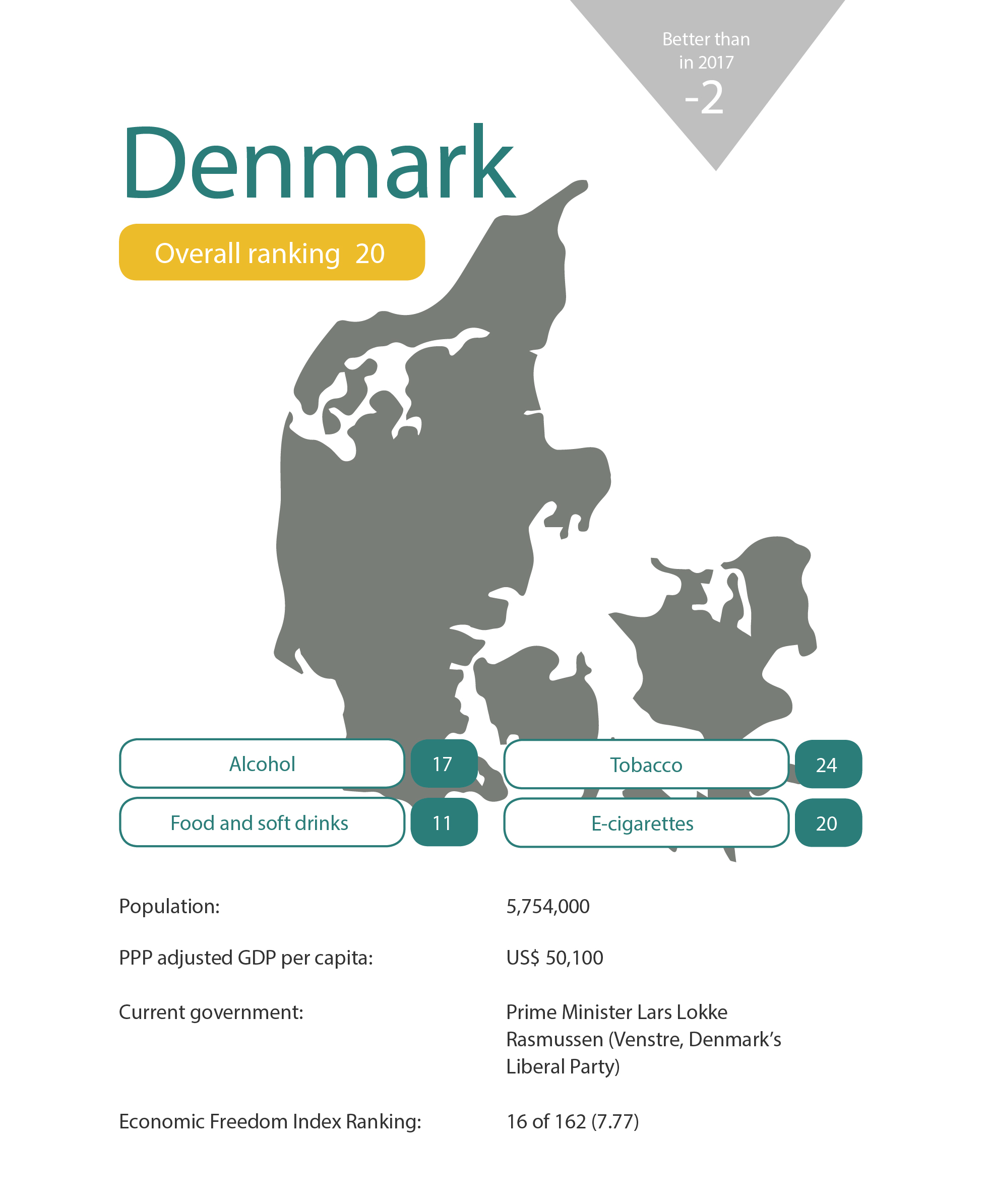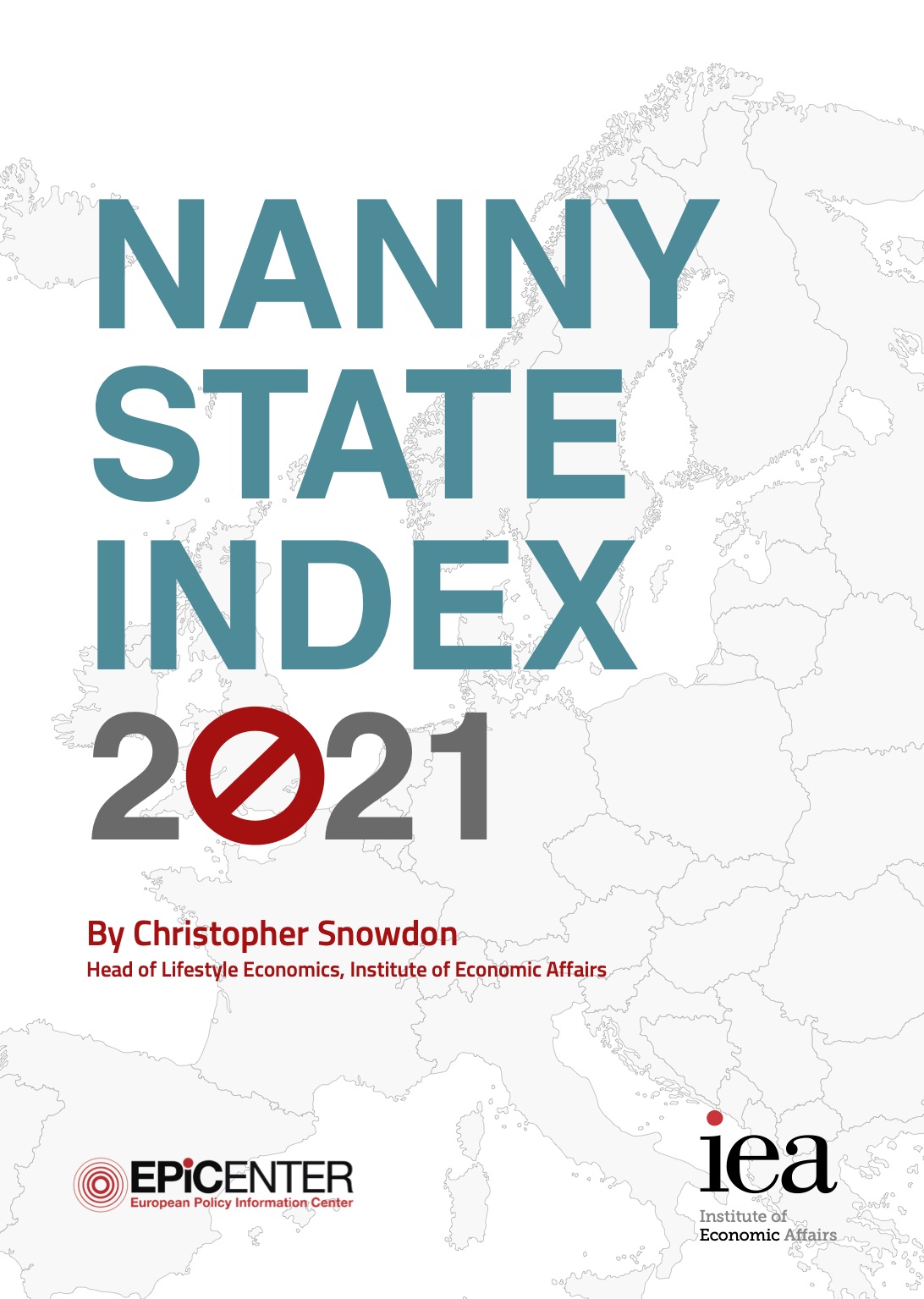
At the risk of damning it with faint praise, Denmark is the most liberal Scandinavian country with more tolerant smoking laws and lower taxes on alcohol and tobacco than its neighbours to the north. Rates of tax on beer and spirits are less than half of those imposed on consumers in Sweden and Finland. In November 2018, the Danish People’s Party agreed to freeze tobacco duty and lower beer and wine duty, partly in order to tackle cross-border shopping. Denmark is the only Nordic country that does not have a statutory closing time for bars.
Until 2016, one of the few dark spots on Denmark’s record was its effective prohibition of e-cigarettes. Classified as medical products, they were unavailable to the public but this changed in May 2016 when the Danes legalised the sale of e-cigarettes and vaping fluids as consumer products. Vaping has always been permitted in public places (except public transport) and there is no tax on vape juice. However, advertising, promotion and sponsorship of e-cigarettes is prohibited in all media regardless of whether the fluid contains nicotine or not.
Loose snus, which escaped earlier EU laws, was banned in January 2016 but there has been no further legislation for tobacco or e-cigarettes since Denmark transposed the EU Tobacco Products Directive into law a few months later. The Socialist People’s Party introduced a resolution for plain packaging in December 2017 but it had no government support and was rejected. A ban on cigarette vending machines is in place but there is no retail display ban (although some of the bigger retailers cover up their tobacco products voluntarily).
More importantly for smokers, indoor use is much less restricted than in most EU countries and tobacco is relatively affordable with duty set at a similar rate to that of Germany. Although smoking is generally prohibited indoors, there is an exemption for small pubs, and smoking rooms of any size are permitted in bars, restaurants and workplaces.
Denmark’s brief experiment with the unpopular ‘fat tax’ came to an end in 2013, after which the government abandoned its plans for a sugar tax, abolished its tax on sugary drinks and cut its beer duty. A tax on confectionary is still in place, however, and trans fats are effectively banned in food.
With thanks to Klaus K.
About
The Nanny State Index (NSI) is a league table of the worst places in Europe to eat, drink, smoke and vape. The initiative was launched in March 2016 and was a media hit right across Europe. It is masterminded and led by IEA’s Christopher Snowdon with partners from all over Europe.
Enquiries: info@epicenternetwork.eu
Download Publication

Previous version: 2019
Categories
About the Editor
Christopher Snowdon is the head of Lifestyle Economics at the Institute of Economic Affairs. His research focuses on lifestyle freedoms, prohibition and policy-based evidence. He is a regular contributor to the Spectator, Telegraph and Spiked and often appears on TV and radio discussing social and economic issues.
Snowdon’s work encompasses a diverse range of topics including ‘sin taxes’, state funding of charities, happiness economics, ‘public health’ regulation, gambling and the black market. Recent publications include ‘Drinking, Fast and Slow’, ‘The Proof of the Pudding: Denmark’s Fat Tax Fiasco’, ‘A Safer Bet’, and ‘You Had One Job’. He is also the author of ‘Killjoys’ (2017), ‘Selfishness, Greed and Capitalism’ (2015), ‘The Art of Suppression’ (2011), ‘The Spirit Level Delusion’ (2010), ‘Velvet Glove, Iron Fist’ (2009).
Denmark 2019

At the risk of damning it with faint praise, Denmark is the most liberal Scandinavian country with more tolerant smoking laws and lower taxes on alcohol and tobacco than its neighbours to the north. Rates of tax on beer and spirits are less than half of those imposed on consumers in Sweden and Finland. In November 2018, the Danish People’s Party agreed to freeze tobacco duty and lower beer and wine duty, partly in order to tackle cross-border shopping. Denmark is the only Nordic country that does not have a statutory closing time for bars.
Until 2016, one of the few dark spots on Denmark’s record was its effective prohibition of e-cigarettes. Classified as medical products, they were unavailable to the public but this changed in May 2016 when the Danes legalised the sale of e-cigarettes and vaping fluids as consumer products. Vaping has always been permitted in public places (except public transport) and there is no tax on vape juice. However, advertising, promotion and sponsorship of e-cigarettes is prohibited in all media regardless of whether the fluid contains nicotine or not.
Loose snus, which escaped earlier EU laws, was banned in January 2016 but there has been no further legislation for tobacco or e-cigarettes since Denmark transposed the EU Tobacco Products Directive into law a few months later. The Socialist People’s Party introduced a resolution for plain packaging in December 2017 but it had no government support and was rejected. A ban on cigarette vending machines is in place but there is no retail display ban (although some of the bigger retailers cover up their tobacco products voluntarily).
More importantly for smokers, indoor use is much less restricted than in most EU countries and tobacco is relatively affordable with duty set at a similar rate to that of Germany. Although smoking is generally prohibited indoors, there is an exemption for small pubs, and smoking rooms of any size are permitted in bars, restaurants and workplaces.
Denmark’s brief experiment with the unpopular ‘fat tax’ came to an end in 2013, after which the government abandoned its plans for a sugar tax, abolished its tax on sugary drinks and cut its beer duty. A tax on confectionary is still in place, however, and trans fats are effectively banned in food.
With thanks to Klaus K.

 Austria
Austria Belgium
Belgium Bulgaria
Bulgaria Croatia
Croatia Cyprus
Cyprus Czech Republic
Czech Republic Denmark
Denmark Estonia
Estonia Finland
Finland France
France Germany
Germany Greece
Greece Hungary
Hungary Ireland
Ireland Italy
Italy Latvia
Latvia Lithuania
Lithuania Luxembourg
Luxembourg Malta
Malta Netherlands
Netherlands Norway
Norway Poland
Poland Portugal
Portugal Romania
Romania Slovakia
Slovakia Slovenia
Slovenia Spain
Spain Sweden
Sweden Turkey
Turkey United Kingdom
United Kingdom
















